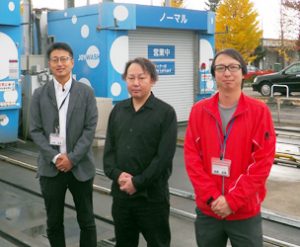Series “New Business Creation NTT East Group Company Solutions”⑭ NTT Telecon’s Water Temperature Monitoring Solution

伊東氏、川上氏、遠藤氏(左から)(From left: Mr. Ito, Mr. Kawakami, and Mr. Endo)
Okamoto is based in Obihiro, Hokkaido, and operates a wide range of businesses nationwide, including gas stations, drive-through car washes, laundromats, rental warehouses, and fitness gyms. In July of this year, ”24 Rent a Car” opened in Obihiro City. The company entered the rental car business in response to rising demand for tourism.
The company’s distinctive feature is that it is developing businesses that can be automated. For example, gas stations and drive-through car washes are basically self-service. Rental cars are also available 24 hours a day. Fitness gyms are also becoming unmanned.
Koichi Kawakami, general manager of the company’s information systems department, said, ”Our company is constantly considering what kind of system would be best to increase productivity.As the labor shortage becomes apparent, we will continue to promote unmanned and labor-saving measures. As part of that, we are also focusing on DX”.
The company is using NTT Telecon’s LPWA terminal ”Guttobikun M2” as a water temperature monitoring solution for drive-through car washes.
As we all know, Hokkaido’s winters are extremely cold, and if you don’t do anything, the water you use to wash your car will freeze.
If it freezes, you won’t be able to wash your car, resulting in a loss of business opportunities. Furthermore, there is a risk of serious accidents such as damage to the piping. Therefore, in the winter, the water used for car washing is heated in a boiler to prevent it from freezing.
On the other hand, if the boiler is left on, the water temperature will rise too much and damage the pipes. Furthermore, the amount of kerosene used to operate the boiler increases, leading to higher costs.
Up until now, staff had been checking the water temperature regularly, turning off the boiler if it was rising, and turning it on if it was falling.
“However, until now, we had to rely on our intuition, turning off the boiler if steam was coming out. Sometimes we would forget to turn it on or off, and our monthly kerosene bill would sometimes skyrocket. These challenges “We wanted to solve this problem, so we started looking for a solution that would monitor water temperature and properly manage the boiler,” said Toshiaki Ito, General Manager of the company’s ILC Strategy Division.
When they consulted with NTT Telecom, which they had originally had a relationship with through LP gas smart meters, we received a proposal for a water temperature monitoring solution using “Guttobikun M2” and decided to start a trial with two systems at one location in Hokkaido. It was 2022.
Specifically, if the water temperature rises above a certain level, an alert email will be sent to the staff. The staff member who received the email checks the boiler and decides whether to turn it on or off.
Currently, the system is operated based on several standards such as low and high temperatures. At the beginning of the trial, they didn’t know what the appropriate standards were, so they decided on them while groping around.
They also collected data from various angles, such as the correlation with outside temperature when alerts were issued, and the time of day when alerts were most likely to occur, in order to find the optimal operational method.
As a result, kerosene consumption was optimized and costs were reduced by about 1 million yen per year.
Yoshiaki Endo of the company said, “We can expect a particularly large effect during the in-season (November-December) and out-of-season (February-March) periods.During these periods, the temperature varies from day to day, so we have to carefully adjust the boiler. By installing a water temperature monitoring solution, it is now possible to grasp the water temperature in a timely manner, making it easier to adjust the boiler. In Hokkaido, the need for car washing increases in the winter. Being able to reduce kerosene costs during this time is a business move. It’s also helpful”, he says.
By the way, during the mid-winter period, temperatures drop to below zero, and as a result, boilers are often left on.
After confirming the effectiveness of the water temperature monitoring solution, Okamoto decided to introduce it at 13 locations, one-third of the company’s drive-through car washes, this fiscal year.
Mr. Kawakami said, “The first trial was conducted in the extremely cold Obihiro city, but this time we will test it in other areas of Hokkaido and the Tohoku area. “We want to collect and verify various data, such as where unnecessary areas are”.
